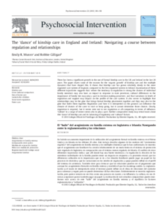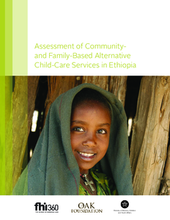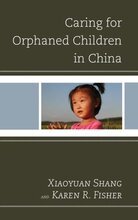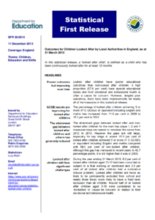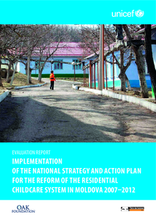Displaying 1891 - 1900 of 2221
This book explores the legal and human rights dimensions of kinship care, the preferred alternative to parental care in the African context.
This article closes a special edition focused on the state of child protection in 16 countries chosen to represent very different cultural contexts, historical backgrounds, and social welfare systems with special attention to out-of-home care placements, principally family foster care and residential care, though several aspects related to adoption were included as well.
There has been a significant growth in the use of formal kinship care in the UK and Ireland in the last 20 years. The paper charts some of the reasons for the 'organic growth' of kinship care and the multiple dynamics that have shaped this.
This article reviews the history and development of out-of-home care services in Germany and the Netherlands comparing trends and numbers.
This paper provides overview of the US and Canada in-care system, noting certain differences and similarities between the two systems. Estimates of the number of children in care in Canada and data on children in the US foster care systems is also provided.
This assessment conducted by FHI 360, with support from Ethiopia's Ministry of Women, Youth and Children Affairs (MoWYCA) and the OAK Foundation aimed to generate evidence about formal community and family- based alternative child care services and service providing agencies in Ethiopia, with a particular focus on magnitude, quality and quality-assurance mechanisms.
This video by Save the Children highlights the major reforms ongoing in Georgia to end harmful child institutionalisation and the work of its project to support the Government in this reform process.
This book by Dr. Xiaoyuan Shang and Karen Fisher provides a comprehensive and clear picture of the situation of children who are orphaned or abandoned in China. It introduces the context and framework for the alternative care system and China’s welfare system as it applies to children, and provides a profile of orphans and of care arrangements, describing both the formal child welfare system and the informal care system, particularly kinship care.
This document is a statistical first release issued by the Department for Education in England that provides national and local authority level information on the outcomes for children who have been looked after continuously for at least 12 months at 31 March 2013. Outcomes reported include educational attainment, special educational needs (SEN), health and wellbeing, offending, substance misuse and exclusions from school.
The Government of the Republic of Moldova launched its childcare reforms in 2006 aiming to establish a network of community social assistants, develop family support services and alternative family placement services, and reorganise residential childcare institutions. This evaluation reviews the implementation of the National Strategy and Action Plan for the Reform of the Residential Childcare System 2007–2012 approved by the Government of the Republic of Moldova in July 2007.

